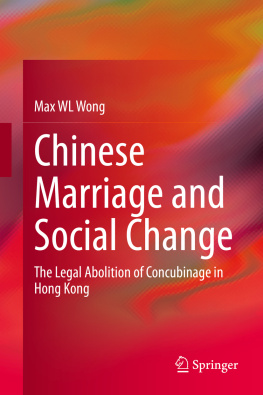PARENTING IN STEPFAMILIES
For Y.T. and Michael
Parenting in Stepfamilies
Social attitudes, parental perceptions and parenting behaviours in Hong Kong
Gladys Lan Tak Lam-Chan
First published 1999 by Ashgate Publishing
Reissued 2018 by Routledge
2 Park Square, Milton Park, Abingdon, Oxon OX14 4RN
711 Third Avenue, New York, NY 10017, USA
Routlegde is an imprint of the Taylor & Francis Group, an informa business
Copyright Gladys Lan Tak Lam-Chan 1999
All rights reserved. No part of this book may be reprinted or reproduced or utilised in any form or by any electronic, mechanical, or other means, now known or hereafter invented, including photocopying and recording, or in any information storage or retrieval system, without permission in writing from the publishers.
Notice:
Product or corporate names may be trademarks or registered trademarks, and are used only for identification and explanation without intent to infringe.
Publisher's Note
The publisher has gone to great lengths to ensure the quality of this reprint but points out that some imperfections in the original copies may be apparent.
Disclaimer
The publisher has made every effort to trace copyright holders and welcomes correspondence from those they have been unable to contact.
A Library of Congress record exists under LC control number: 98074644
ISBN 13: 978-1-138-32745-0 (hbk)
ISBN 13: 978-1-138-32746-7 (pbk)
ISBN 13: 978-0-429-44923-9 (ebk)
I wish to take this opportunity to express my deepest gratitude to the following persons who have given me invaluable support and advice from planning to completion of this study, on which my PhD thesis and this book are based.
First of all, I wish to thank the supervisor of my PhD study, Professor Olive Stevenson, for her very helpful advice, critical comments and unfailing guidance. Professor Stevenson has facilitated me to appreciate knowledge with breadth and depth. I feel rich and am blessed by Professor Stevenson's wisdom and support in helping me to face the challenges in this study. I must also thank my second supervisor, Professor Diana Mak most sincerely for her generous support and insightful advice. I am also grateful to the Hong Kong Polytechnic University for its staff development programme, which has given me generous support for my PhD study. Special thanks must be extended to Professor Phyllida Parsloe, the external examiner, and Mr. Bill Silburn, the internal examiner of my PhD thesis for their constructive comments.
This study could not have been completed without the useful suggestions and kind support of my friends in the field and colleagues at work. They have also shared my joy and frustrations, their kindness will always be remembered. I am especially indebted to the organizations who have given me help in the referral of informants or provision of figures and data; they are: the Family Service Department of the Caritas-Hong Kong, Against Child Abuse, and the Family and Child Care Division of the Hong Kong Council of Social Service. Special thanks are due to the stepmothers, social workers and teachers who took part in this study. I am greatly touched by their life stories and their trust in me. Their openness in sharing with me their feelings and information have made the data collection process a most unforgettable experience.
This acknowledgement is not complete without mentioning some important persons in my life. I want to thank my colleague, the late Miss W.S. O for her encouragement to take up this study and her kind friendship. I am also grateful to Professor Margot Breton for her emotional support and understanding of the difficulties as a working mother embarking on such a demanding task on a part-time basis. I must also extend my deepest thanks to Dr. Julia Tao and Dr. Elsie Ho, who have always been caring friends and a source of strengths for me. I am also thankful to my parents for their frequent words of encouragement, my elder sister Julia, and my elder brothers Colin and Albert for sharing my worries and shouldering additional responsibilities in taking care of our frail parents when I was deeply involved in this study. Last but not the least, I owe a great debt to my husband, Y.T., and my son, Michael, for their understanding and unfailing support. I wish to dedicate this book to them as a token of my appreciation.
That dear octopus we call the family, from whose tentacles we can never quite escape.
Dodie Smith, DEAR OCTOPUS
A family is a place where we are born and brought up. It brings us joy and gives us pain. We love it, we hate it. But once we are part of it, we will always be so. Some people aspire to harmonious family life and happy marriage, but their experiences are not quite what they anticipate. This book is a record of my investigation into the untold life experiences of some people in Hong Kong who expected better family life and happier marriages the second time. I shall begin by explaining why I was interested in exploring stepfamilies in the society in which I have been living since birth.
Background and Rationale for Pursuing This Study
In recent years, research into family life conducted by researchers and clinicians from developed countries has caused concern with the figures related to divorces and stepfamilies. From the United Nations Demographic Yearbook 1993, the crude divorce rateconcern. Goode (1993) pointed out that the divorce rate for the married women in the United States in 1988 was 21 per 1,000. Marriage and Divorce Statistics of England and Wales (1993) show that the divorce rate for persons divorcing per 1,000 married population in England & Wales was 13.9 (HMSO, 1995). According to 'Social Trends 1995', divorces in United Kingdom increased sharply to 173,000 in 1992, that is, more than double the number in 1971 (Governmental Central Statistical Office, 1995).
In the United States, as predicted by its National Center for Health Statistics in 1990, one in two marriages will end in divorce, and 40% of children born in this decade will experience the breakup of their parents' marriage (Petersen & Steinman, 1994). Fine & Schwebel estimated 8.8 million of all children under the age of 18 in the United States (19.1%) live in stepfamilies and 5.8 million (12.7%) are stepchildren (Fine & Schwebel, 1991). McGoldrick & Carter predicted that by 1990 one in six children would live in a remarried family (Walsh, 1992).
In the United Kingdom, statistics in 'Social Trends 1995' show that 'remarriages grew rapidly in the 1960s and 1970s, from 14% of all marriages in 1961 to 34% in 1981 (Government Central Statistical Office, 1995, p.36). Overall, more than a third of all marriages in 1993 were remarriages and there were about half a million stepfamilies in Great Britain in 1991 (Government Central Statistical Office, 1996). The Stepfamily Information Sheet shows that it is likely that more than 1 million children are living in stepfamilies and that a further 1.5 million are currently living with a separated or divorced parent who may remarry. One in four children is likely to grow up in a stepfamily (Robinson, 1993). These growing figures have alerted the helping professionals to the fact that problems generated by stepfamilies and stepparenting should not be underestimated.








